English Edition

- By CNI
- Category: English Section
- Hits: 970
CNI News
October 27, 2023
Three Brotherhood Alliance has waged Operation 1027 to prevent from air strikes and heavy weapon attacks, the alliance stated on 27 October 2023.
The operation also contains dying out online scams and putting down online game companies, said in the statement.
" The operation of the three brotherhood intends to protect the lives and properties of the people, to defense ourselves, to control our region more than now, to prevent from attacks by air strikes and heavy weapons at any time day and night and to eradicate the military dictatorship that the entire people have wanted." said Three Brotherhood Alliance.
Three Brotherhood contains the Arakan Army (AA), the Ta,ang National Liberation Army (TNLA) and Myanmar Nationalities Democratic Alliance Army (MNDAA).
The battles severely broke out along the Pyidaungsu Road and firing sounds of heavy weapons were also being heard, a Lashio resident told CNI News.
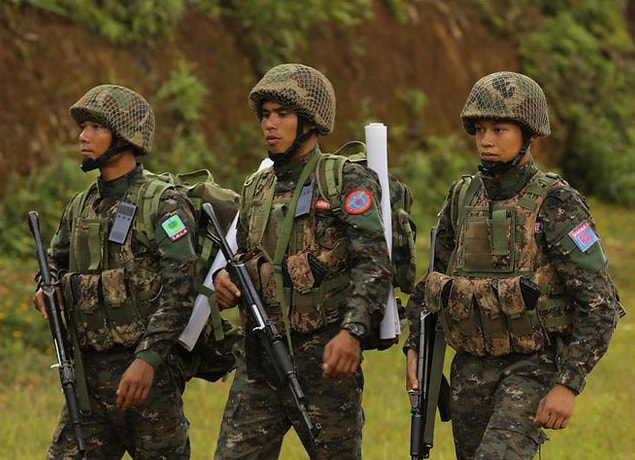
" I don't know about it thoroughly as much as my brother. I had to know a toll gate on the other side had been damaged. Photos have been uploaded online. I don't hear firing sounds any more. I heard them not long ago. The road which goes to Muse and the road going to Chin Shwe Haw have been closed." she said.
As parts of Pyidaungsu Road, the road between Lashio and Chin Shwe Haw and the road between Lashio and Muse have been closed in an emergency starting from 6:00 a.m. 27th October 2023.
Battles were breaking out along the Pyidaungsu Road and trucks have been stopped, a Muse truck driver told CNI News.
" We haven't gone because the road is not in a good situation. We have to save our skin. I heard battles are breaking out in Muse. Because we are at 5 Mile for the time being, we are here stable. Battles took place in Lashio this morning. I'm not sure whether battles are taking place just now." he said.
AA, TNLA and MNDAA are northern EAOs that are collaborating in military and politics.

- By CNI
- Category: English Section
- Hits: 1216
CNI News
October 26, 2023
Import permit of fuel-powered vehicles that has been banned due to the need of foreign currency has not been possible to be re-permitted at present, said car importers and car policy analysts. Old cars that have been 20 years old and above can be used safely and due to the need of foreign currency, it has not been possible to to re-permitted, said car policy experts. However, preparations are being made to allow to produce cars with a SKD (Semi Knocked Down) system, U Aung Pyae Sone, a car policy expert told CNI News.
" The cars such as Mark II manufactured around 2000 by Toyota are being still used. When these cars cannot be used, a policy to import cars may be come out. But for the time being, the permission to import fuel-powered cars has not come out because there isn't enough foreign currency in the country. But preparations are underway to produce cars in the country with a SKD system, internal production of cars may be allowed in the near future." he said.

While seeing EV cars in Naypyidaw
There are over 1,000,000 fuel-powered cars all over the country and over 50 percent of using hem are registered in Yangon Region, according to the records of the Directorate of Road Transport. Currently, commercial vehicles and EVs import permit has been allowed. According the current car policy of the government, using fuel-powered vehicles has been reduced and EVs are being mainly imported, U Min Min Maung, chairman of Yangon Region Automobile Manufacturer and Distributor Association (YRAMDA), told CNI News.
" The government has told that it will allow EVs only to be imported. Fuel-powered cars will be banned later at all. For the time being, SKD cars have been allowed. But after SKD cars are reduced gradually, EVs only will be imported." he said. The government should allow production of fuel-powered cars with SKD system although fuel-powered cars were not permitted to be imported due to the need of foreign currency, U Thet Zaw, an economic analyst, told CNI News.

While seeing an electric car charging station
" According to the current trading activities of the country, essential things should be imported. Non-essential things are luxurious goods. But non-essential things should be allowed to an certain extent. Rather than banning at all, a certain percent should be allowed. For example, SKD cars are re-allowed. If fuel-powered cars are allowed to be imported, an organization that will take advantage of permission will arise such as importing EVs. If anyone can import, it won't be convenient. I want to suggest that SKD cars should be re-allowed." he said.
Although Myanmar's neighboring countries and other countries are widely using EVs instead of fuel-powered cars, Myanmar is falling behind, some people pointed out. The current value of an EV car in Myanmar is not within the reach of ordinary people.

- By CNI
- Category: English Section
- Hits: 601
CNI News
October 27, 2023
The United States of America is continuously trying to enable the group it wants to gain power in Myanmar in order to control China, a neighboring country of Myanmar, said Sr-Gen Min Aung Hlaing, chairman of the State Administration Council. He said the above at the meeting (5/2023) of the SAC held on 26th October 2023.
The Western group led by the United States has continuously intervened in the affairs of Myanmar. Myanmar and the United States are not enemy countries; There has never been a war between the two countries; Myanmar was not involved in the Vietnam War due to US invasion in the southeast Asia.
However, the reason why the US is treating Myanmar like an enemy is because of a great background, said Sr-Gen Min Aung Hlaing.
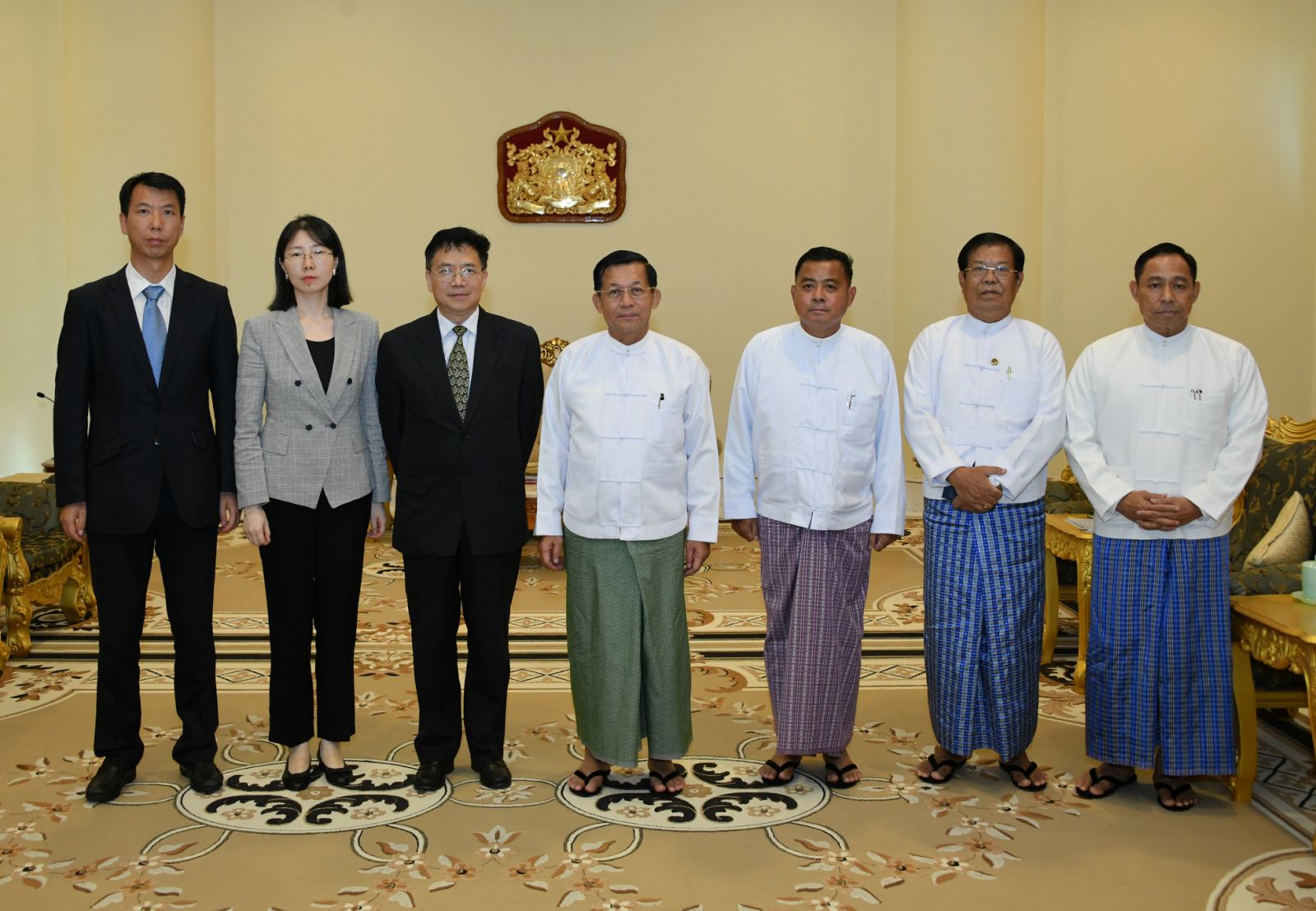
While seeing Sr-Gen Min Aung Hlaing and Chinese special diplomat Deng Xijun
The Southeast Asia Treaty Organization (SEATO) led by the US was formed in 1954 to prevent communism from gaining ground in the region. However, SEATO was dissolved on 30 June 1977. 1947 Constitution of Myanmar contained the rights of states to secede and based on these rights, states demanded to secede in 1961-1962. If compared the demands of the states with the SEATO process, Myanmar political complexity could be understood, he said.
" In the political affairs of Myanmar, when things they want don't become to be, US is obviously fighting against the elements that can protect not to become what it wants. The current policy of the western group led by US is the China containment. So, the US is continuously carrying out to enable the government or the group to gain power. As long as the group doesn't gain power, the US is working to bring chaos to all sectors in Myanmar.” he said.

While seeing a diplomat from US Department of State and NUG Foreign Minister Daw Zin Mar Aung
Moreover, the US is helping terrorist groups on various topics and reasons. India, Thailand, Singapore, Malaysia and Indonesia have been friendly countries for ages according to historical tradition. However, the countries that cannot overcome the influence of the United States have imposed trade and financial sanctions on Myanmar. Myanmar is not a country that survives and trades on the only one financial system. Myanmar had to collaborate with its neighboring friend countries and other friend countries, he added. At present the US and Singapore have imposed sanctions on Myanmar government-owned banks including the members of the SAC.
The US government is supporting finance and technologies to the National Unity Government (NUG), the People's Defense Force (PDF) and political activists. Moreover,
The US has also reduced diplomatic ranks at the US embassy in Myanmar

- By CNI
- Category: English Section
- Hits: 656
CNI News
October 27, 2023
Although about one million Russian tourists entered Thailand from January 2023 to September 2023, nearly 2,000 Russian tourists arrived in Myanmar during the same period. According to the Ministry of Hotel and Tourism, 1,896 Russian tourists only entered Myanmar from January to September this year.
Myanmar-Russia tourism sector has been continuously promoted since 2022 and direct flight between the two country has started. So, it was necessary to know why the number of Russian tourists who come to Myanmar was few, U Zaw Zaw, chairman of the Hotel Entrepreneurs Association, northern Shan State, told CNI News.
" Thailand has relaxed a lot of restrictions on tourists. And Thai visa has allowed tourists to stay for 30 days. Thai officials know to target which tourists and that they want the market of which tourists and what the market is demanding. So, they make the necessary relaxations. Thai government also gives full powers to tourism officials. They cooperate very hard. So, They are better than us, I think. The reason why a lot of Russians come to Thailand is related to their travel arrangements,their facilities, price differences and Russia's interests. We need to change our policy. What should be relaxed must be relaxed. We have to do a lot to make tourists safe. We need to know what they want and what are things they are interested in, I think." he said.
Only Russian tourists entered Myanmar between January and September in 2022. But during the same period in 2023, the number of tourists has more than doubled compared to last year. However, the growth rate is still low, hotel and tourism entrepreneurs pointed out. For the influx of tourists from war-torn Russia, the strategies used by Thailand should be studied, U Thet Lwin Toe, a tourism entrepreneur, told CNI News.
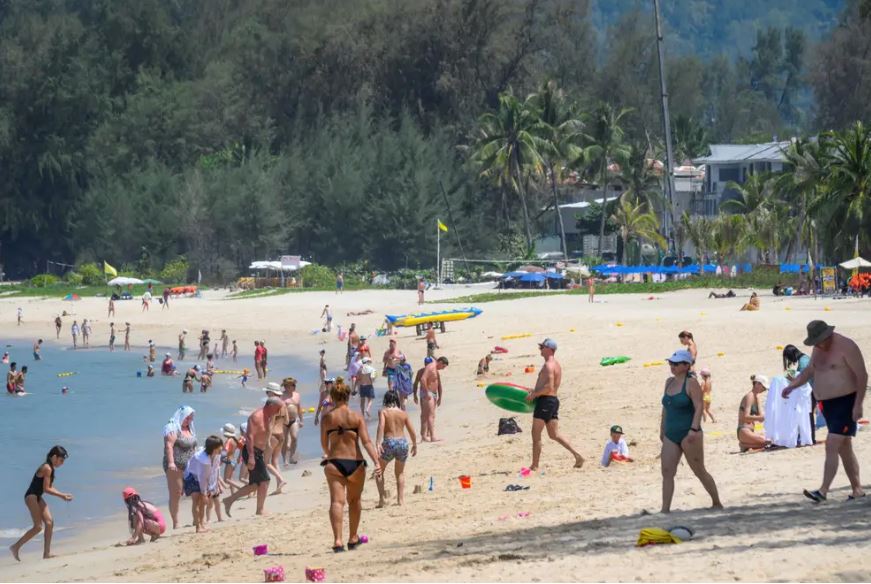
While seeing Russian tourists at the Phuket Beach in Thailand
" Thailand gives return visas to Russians free of charge. And they are allowed to stay in Thailand for three months or one year. Moreover, they are allowed to stay in long stay apartments at the beaches, which is kind of similar to home stay. Hotels are, as you know, very expensive and suitable to stay for a few days. Besides, Thai authorities have created nightlife and entertainments to make tourists happy. Russians spend a lot on shopping and drinking. But Myanmar has not created nightlife to attract tourists. Although hotels here in Myanmar are not too expensive, security is important to tourists. Whatever tourists do in Thailand, they are safe. Tourist policemen are protecting them. But safety cannot be guaranteed here." he said.
Russian tourists came to Myanmar for their interest only rather that for spending their leisure. So, the tourists like that would not be welcome, some hotel and tourism entrepreneurs pointed out. At present, 80,221 Chinese tourists entered Myanmar between January and September 2023 and over 70,000 increased compared to same period last year, according to the Ministry of Hotel and Tourism.
Moreover, the number of Indian tourists like Russian, Chinese and Thai tourists will probably increase, hotel and tourism entrepreneurs have expected.

- By CNI
- Category: English Section
- Hits: 722
CNI News
26 October 2023
The National Unity Government (NUG) made a request to the European Union (EU) dated 16th October to recognize the NUG as an official government.
The NUG requested the EU to recognize the NUG and the state governments that are developing step by step as Myanmar's official governments.
It had not been possible to reach a situation Myanmar was going to be a country which was made up of provinces, U Than Soe Naing, a Myanmar political commentator, told CNI News.
" It's necessary to become like that. But it's not been likely to be like that at the moment, I think. Because can we say how many state governments there are? Cbin people are still trying to become their Chin State government. In the same way, the Karenni National Democratic Force (KNDF) has kind of form the Karenni State government and so has the Karen National Union (KNU). The Kachin Independence Army (KIA) that has been able to have systematically organized its executive mechanism has not declared to have formed its State government. So, We haven't been able to reach the situation that we can organize Myanmar as country that has made up of state governments, I think."he Said.
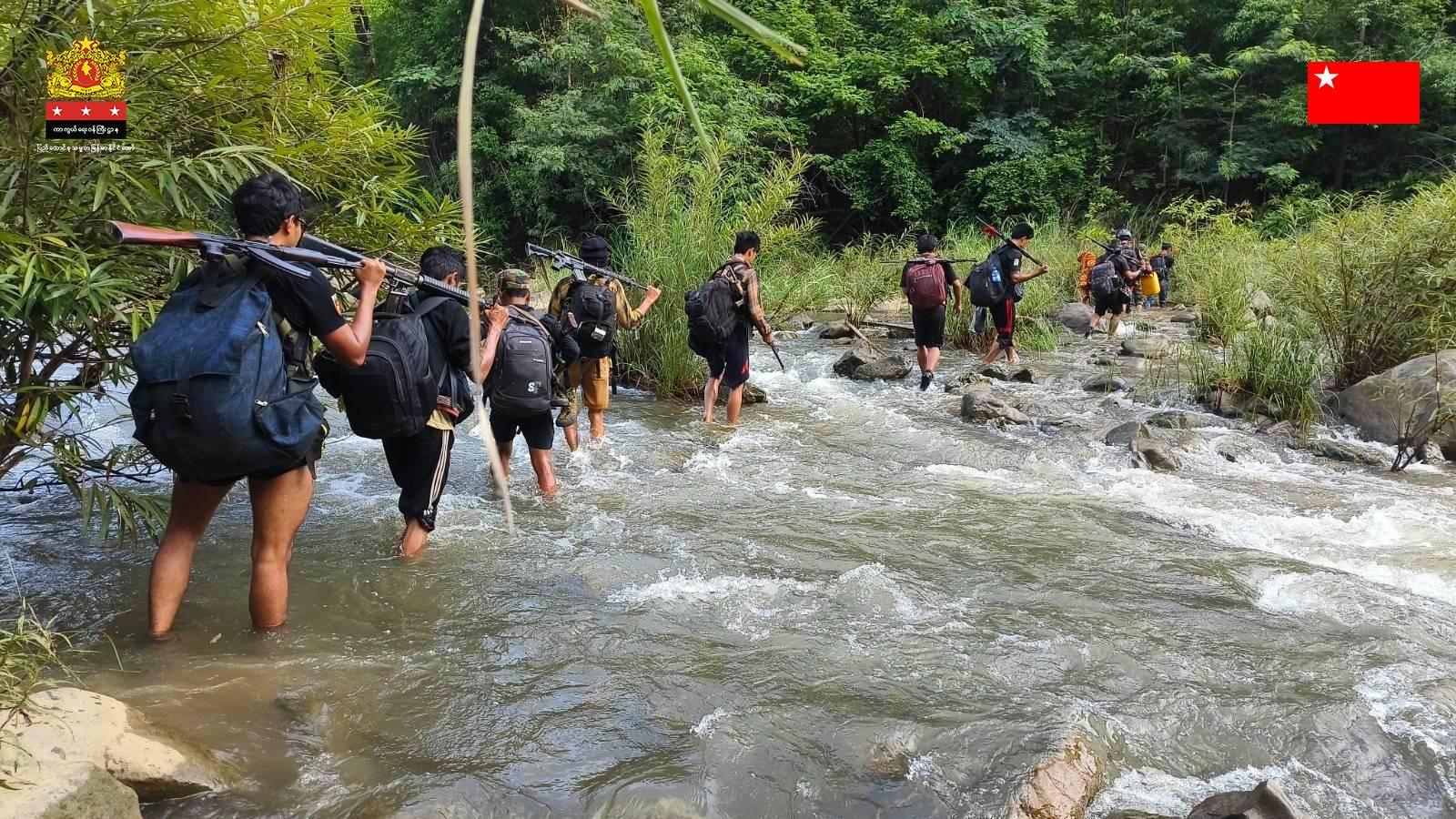
While seeing the People's Defense Force
Moreover, the NUG has requested the EU to invite the NUG delegates to attend the bilateral meetings and multinational meetings of the EU in order to know the public voice and to enable them to officially represent.
Having said that the NLD government was trying to form a government without solving the ballot dispute, the Tatmadaw toppled down the NLD government on 1 February 2021.
After that, with protests that arose, democratic elements have been waging the Spring Revolution.
EU had no business to recognize the NUG as an official government of Myanmar, Dr. Aung Myo, a Myanmar political commentator told CNI News.
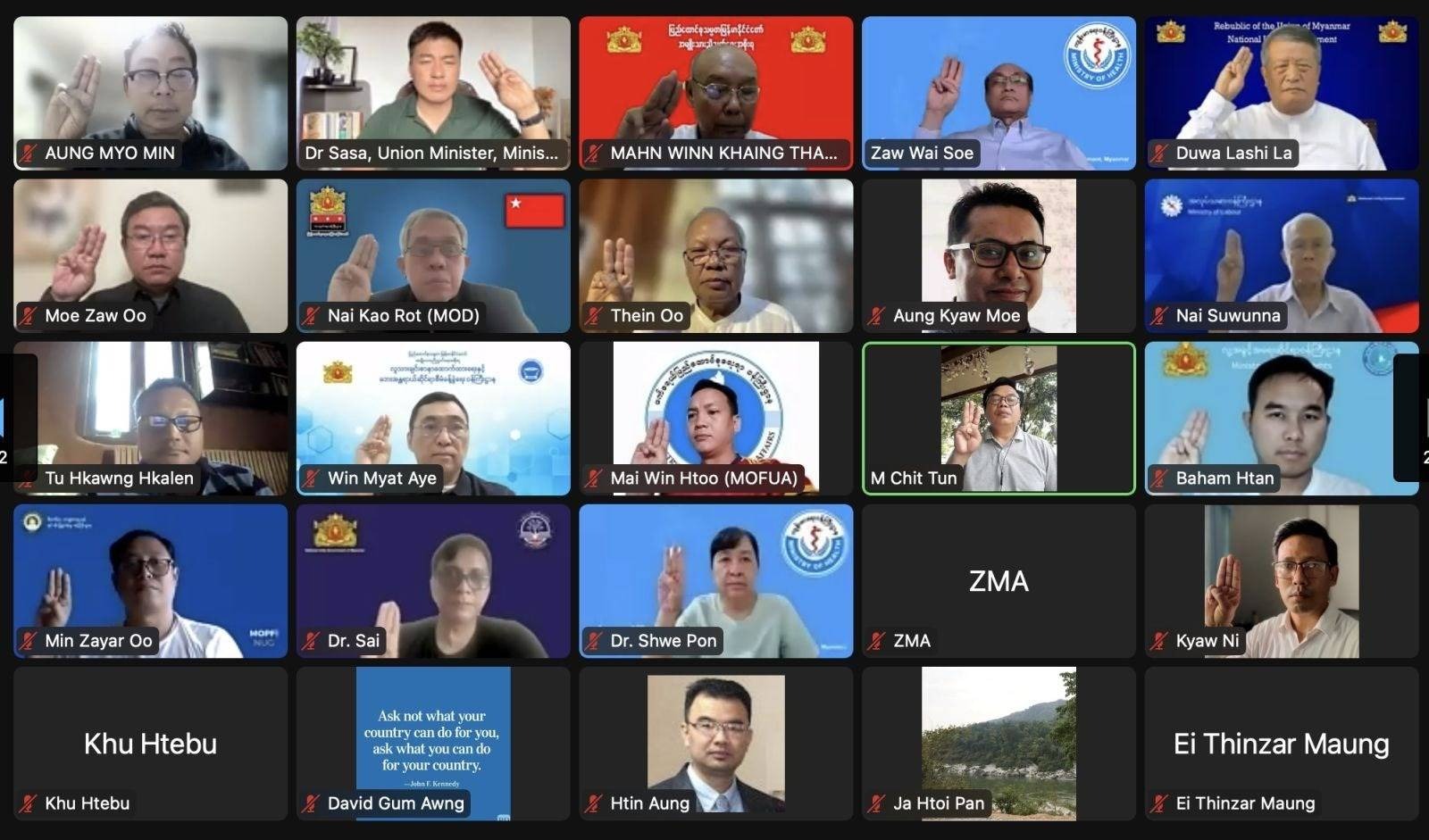
While seeing members of the NUG
" EU won't recognize the NUG as an official government. To tell you the truth, a government is decided depending on a real situation rather that whether it is legitimate or not. It is an international tradition. If the NUG is recognized as an official government, who will carry out for the licenses for the businesses in the EU and for passports and visas. It's not that easy. And then, EU has no business to recognize the NUG as an official government." he said.
At present, the KNDF kind of has formed a state government and the rest of the states also seem to be in the process of forming state governments, he added.
Currently, the State Administration Council and the NUG are competing in the affairs of administration, judiciary, legislation and diplomacy.
However, in practice the SAC is handling administration, legislation and judiciary, and international ambassadors also are giving their letters of appointment to the SAC.

- By CNI
- Category: English Section
- Hits: 1456
CNI News
26 October 2023
As Myanmar overseas employment agencies have to pay license insurance fee to the government, they might ask workers more service charge, those who are helping migrant workers told CNI News.
The Ministry of Labor is negotiating with agencies to raise license insurance until three times higher than the current rate. If the license was raised like that, agencies probably would ask workers more service charge, they pointed out.
" Some agencies break the law without complying with provisions and ethics. So, workers got into trouble. These agencies should be taken action against. Otherwise raising license fee doesn't make any difference. Relevant laws have been imposed. There are places where you can complain. But this mechanism doesn't work in practice. As there are many workers who want to go abroad for work, although service charge for a worker has been designated 500,000 kyats by the government, if agencies asked 1,000,000 kyats, there are many workers who will pay. If you asked the workers why they complained, they wouldn't answer. It is important for them to go abroad ASAP in any way. If he didn't pay 20 lakh kyats, those who would pay 21 lakh kyats were so many behind him, one of workers told me." said U Min Oo, in charge of labor affairs from the Foundation for Education and Development (FED).
The government is carrying out to raise license insurance fee for overseas employment agencies from 250 lakh kyats to 1,000 lakh kyats and for overseas employment agencies (Thailand) from 50 lakh kyats to 200 lakh kyats. The government has officially designated service charge rates that agencies will ask.
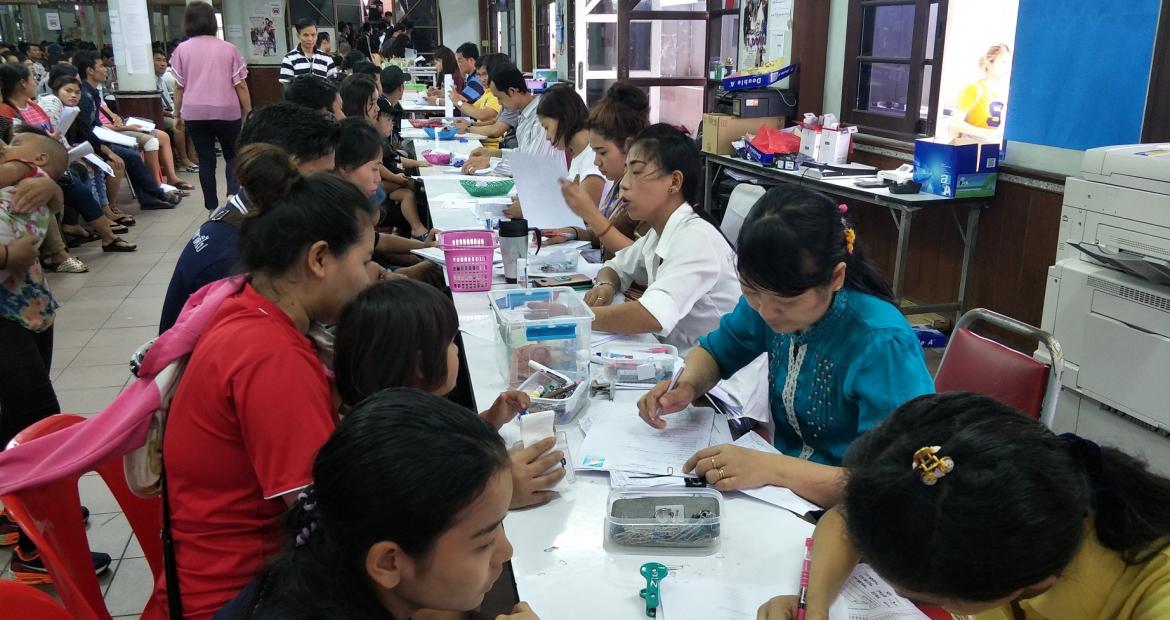
Those who will go abroad through agencies
If a person goes to Japan as a technical apprentice trainee, it will cost him 2,800 US dollars and as a skilled worker, 1,500 US dollars.
After working in Japan for three years, if a person goes to Japan again to work for a new employer, it will cost him 1,600 US dollars and if he goes there again to work for the former employer, it will cost him 200 US dollars.
If you go to Singapore for high levy, it will cost you 1,800 SGD and for low levy, 2,300 SGD. If you go to Singapore with a S-Pass, it will cost you 4,400 SGD. And if you go to Malaysia, it will cost you 850 US dollars and 25,500 kyats. Moreover, if you go to Thailand for the job that applies Thai SSB, it will cost you 300,000 Myanmar kyats and 7,600 Thai bahts.
Although service charge has been officially designated, in practice it will cost you more than the prices designated. The government is weak in tackling the problem and if the license insurance fees were not changed, it would be convenient, U Ba Yi, in charge of labor affairs from the Migrant Workers Rights Network (MWRN) told CNI News.
" If possible, former license insurance fee is convenient, I think. If the agencies have to pay the government any more, they will surely ask the workers any more. Although the government has designated that agencies must not ask more than 300,000 kyats for service charge, agencies are taking from 25 lakh kyats to 45 lakh kyats. Zero cost workers are convenient. Their employers take responsibility for the cost for them. If possible, unchanged rate of license insurance fee will be convenient for both agencies and MoU workers, I think." He said.
Currently, the Ministry of Labor and Myanmar Overseas Employment Agencies Federation (MOEAF) are negotiating relating to raising license insurance fee reportedly.

- By CNI
- Category: English Section
- Hits: 753
CNI News
26 October 2023
Due to the lack of regional stability in most of the townships in Mon State where rubber industry is located than last year, it is difficult to conduct rubber resin extraction business in most rubber farms, said rubber businessmen.
Because battles are breaking out between the Tatmadaw and revolutionary forces in Kyaikto, Bilin, Yay townships where most of rubber is produced, it is difficult to hire skilled workers in cutting and extracting rubber resin reported.
Moreover, because there are curfew and traffic restrictions in some areas, it is getting more difficult to work, said the people who do business of cutting and extracting rubber resin.
Because it has been raining up to now, rubber season is late to come. So, it might impact on the rubber industry, an official from the Mon State Rubber Producers Association, told CNI News.
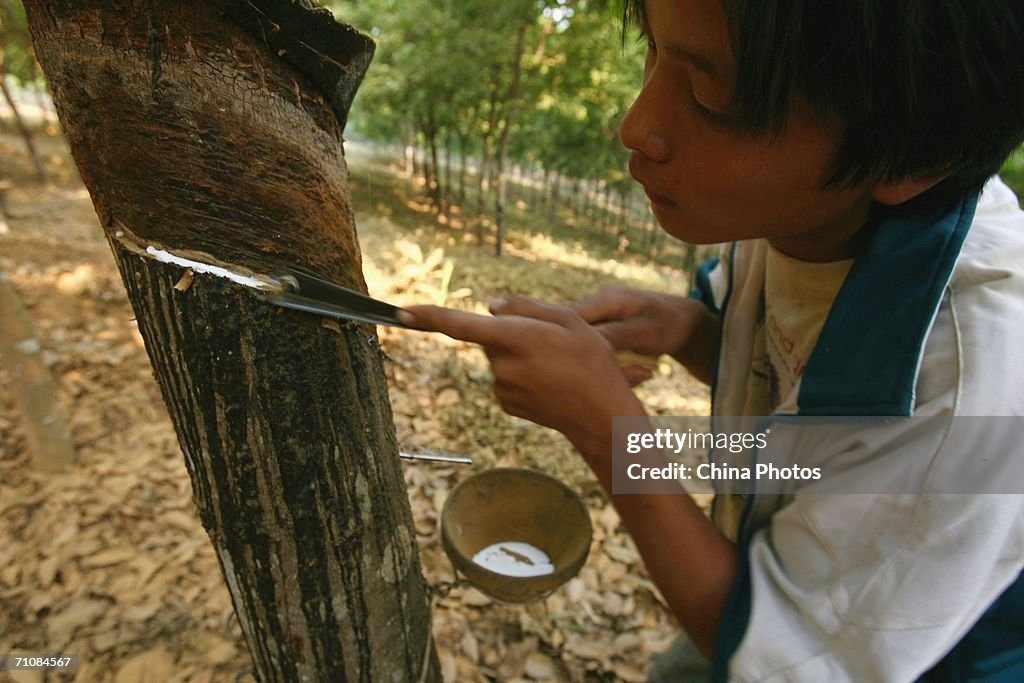
While seeing a person cutting bark to extract rubber resin
" For the time being, rubber planters are making preparations. They have started doing business of cutting and extracting rubber resin. But the rubber season is about one month late to come because it's still raining. We start cutting rubber bark just now. Some rubber farms haven't got enough workers to cut rubber bark. And we are not allowed to go to the restricted areas. Restricted areas have increased. It can impact on rubber production a bit." he said.
Rubber entrepreneurs are finding it difficult to hire workers to cut rubber bark and extract rubber resin due to territorial instabilities and because it is difficult to go on working, some entrepreneurs are planning to sell their rubber farms.
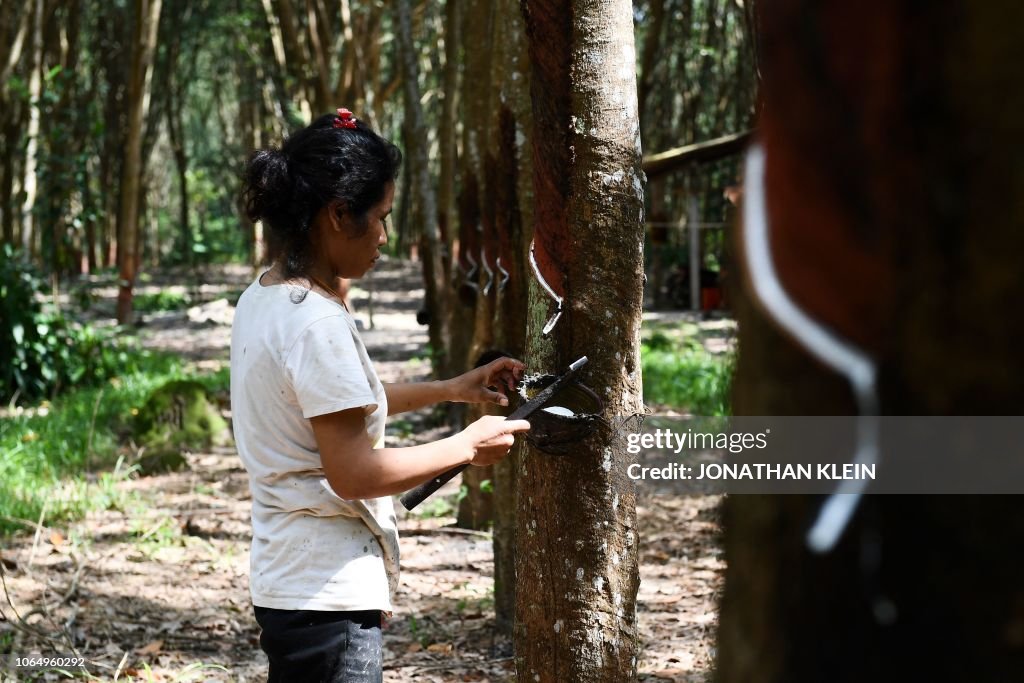
While seeing a person cutting bark to extract rubber resin
Although territorial instabilities have increased in Kyaikto, Bilin and Yay townships, rubber farms in Kyaikmayaw, Thanphyu Zayat, Thaton and Paung townships are regularly operating reportedly.
Although rubber season is late to start due to weather condition, because the rubber price is higher than last year, it may be beneficial to the farmers, U Min Tun, a rubber entrepreneur from Kyaikmayaw Township, told CNI News.
" The difficulty is that it's late to cut rubber resin out this year because the rain hasn't let up. Income can decline. Normally at this time of the year, cutting out rubber resin had been about one month long. But this year, some are still preparing and so cutting period will be short. For the time being, rubber price is higher than last year. If the price is stable all the year round, it will be beneficial to the farmers." he said.
Mon State is the region that produces rubber most in Myanmar and there are more than 500,000 acres of rubber cultivation in the state, producing more than 100,000 tons of rubber each year.

- By CNI
- Category: English Section
- Hits: 603
CNI News
25 October 2023
The government should provide assistance to the farmers whose plantations in eastern Bago Region were destroyed due to flood a few days ago, said farmers and those working on farmers' issues.
In the law protecting farmers' rights, issuing long-term loans, providing service to enable farmers to get suitable profits for the crops they produce, Providing the necessary equipment on time, facilitating farmers to enter the workforce and the State must support farmers when their plantations are damaged by natural disasters are included.
According to the provisions imposed in the Farmers Rights Protection Act and the Interest Promotion Act, that rice fields were flooded and damaged in eastern Bago Region was because of natural disaster.
So, the farmers should be given subsidies by the government, U Thein Aung, chairman of the Farmers Development Association, told CNI News.
“The fact that the government must give subsidies to the farmers whose plantations are damaged by the natural disaster is included in the Farmers Rights Protection Act and the Interest Promotion Act. So, the government support the farmers to an extent. The government should support about the loan for planting costs. Farmers had to spend at least 450,000 kyats for an acre, not including costs for reaping." he said.
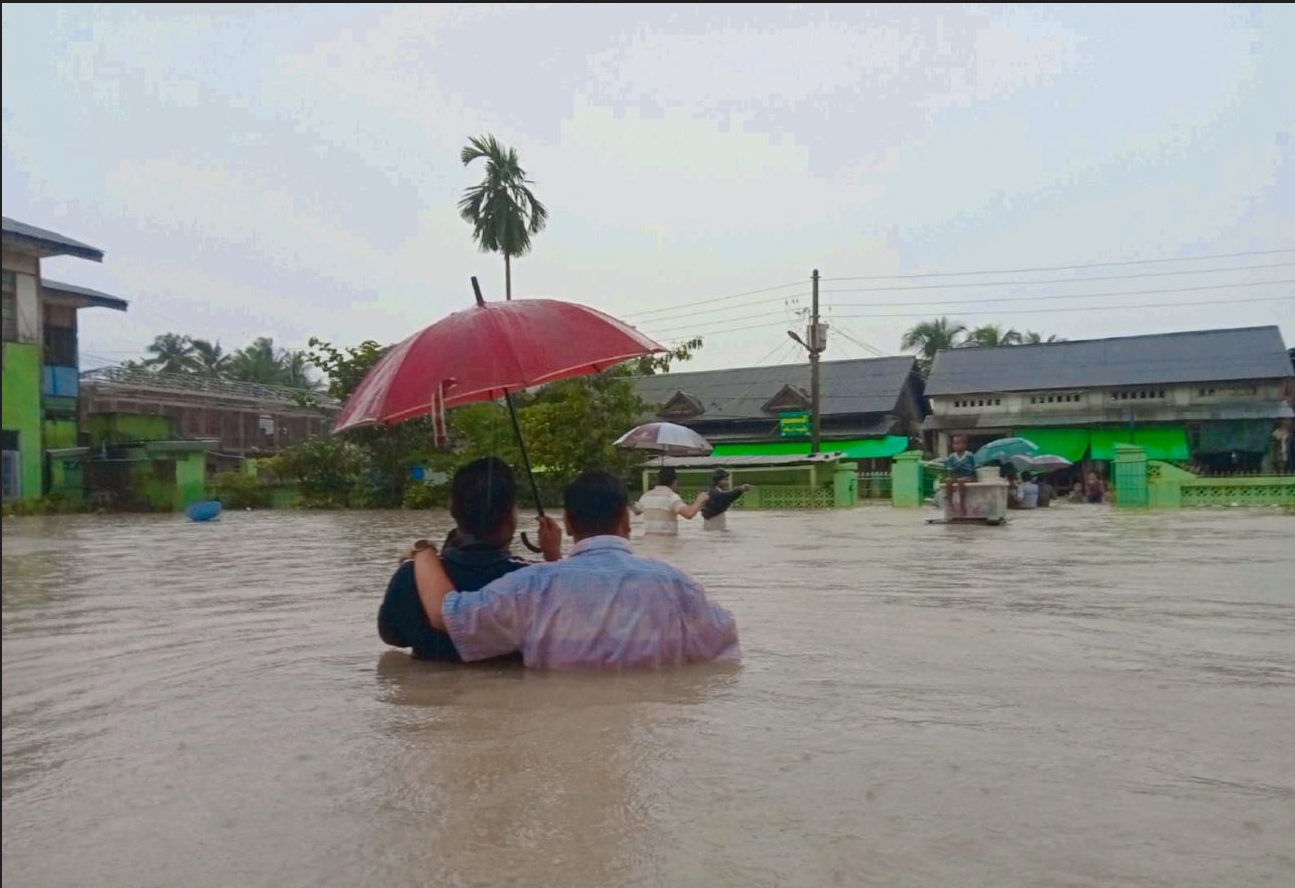
while seeing flood in Bago
Due to flood, unripe rice fields cannot be harvested, and ripe rice fields were also damaged and yields will decrease, farmers will make a loss. Therefore they would not be able to repay the loans taken for agriculture this year, farmers said.
He wanted the government to provide loans for winter crops ahead of schedule in order to repay the debt and to re-plant crops, U Nyunt, s farmer from Thanatpin Township, in eastern Bago Region, told CNI News.
" The government should issue loans earlier for cold season crops. In the past, 100,00 kyats per acre was lent. But 200,000 kyats per acre cost farmers for cold season crops. Because there were plantations destroyed as well, in any case, the government should support 200,000 kyats per acre, not as a loan." he said.
Although the number of plantation acres destroyed due to flood is being recorded, the government has not done anything relating to supporting the farmers reportedly.
Due to flood, over 77,000 acres of paddy fields in the four townships in eastern Bago were sunk and 6,800 acres were damaged, according to the Bago District Agricultural Department.

- By CNI
- Category: English Section
- Hits: 2037
CNI News
25 October 2023
Those who wanted to renew their passport for job (PJ) and passport for seamen (PS) must pay income tax for six months in advance when they applied for proof to have paid tax already, the Internal Revenue Department told CNI News.
If a certificate of having paid tax already at the Internal Revenue Department can be shown, passport renewal can be performed, Myanmar Passport Issuance Board stated.
When applying for a certificate of having paid tax already, income tax for six months from 1st October 2023 to 31st March 2024 must be paid in advance as the income tax is two percent of minimum wage rate available in the destination country, an official from the Central Board of Taxation Service told CNI News.
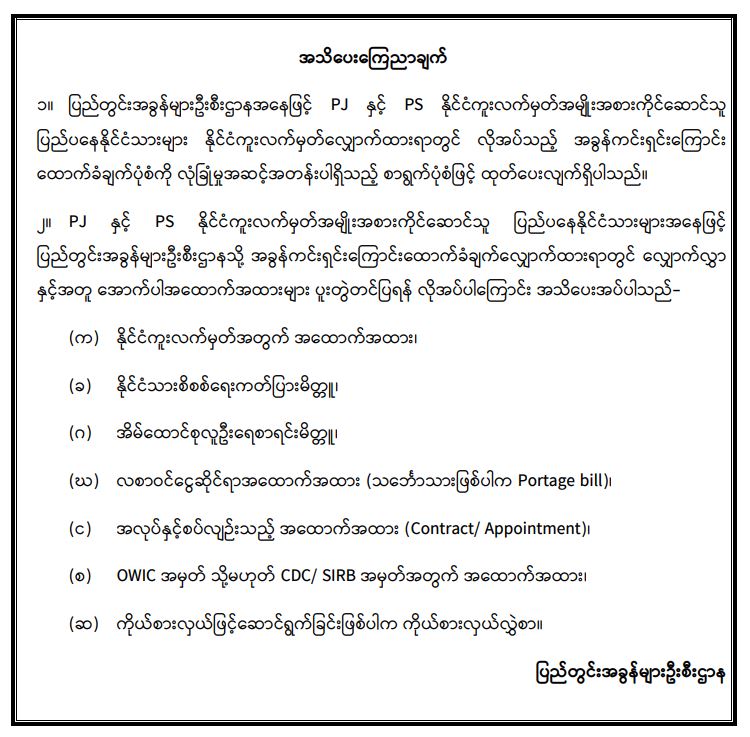
While seeing the statement released by the Internal Revenue Department
" During the past few days, the office that provides service for passport renewal has asked those who come and renew their passports especially PJ and PS to show certificates of having paid tax already. If they show the certificates, their passports can be renewed.
Three or four departments have to negotiate details. Some people change their PJs into passport for visit (PV). Some countries have not been able to designate basic salary. The ministries still are negotiating. Detailed facts will come out." he said.
When a person takes a certificate of having paid tax already, citizen registration card, household table, if he is a seaman, a contract for work and agreement evidence for salary must be shown together.
If all the necessary information and documents were complete in obtaining such approval, it would take an applicant about two days, according to the Internal Revenue Department.
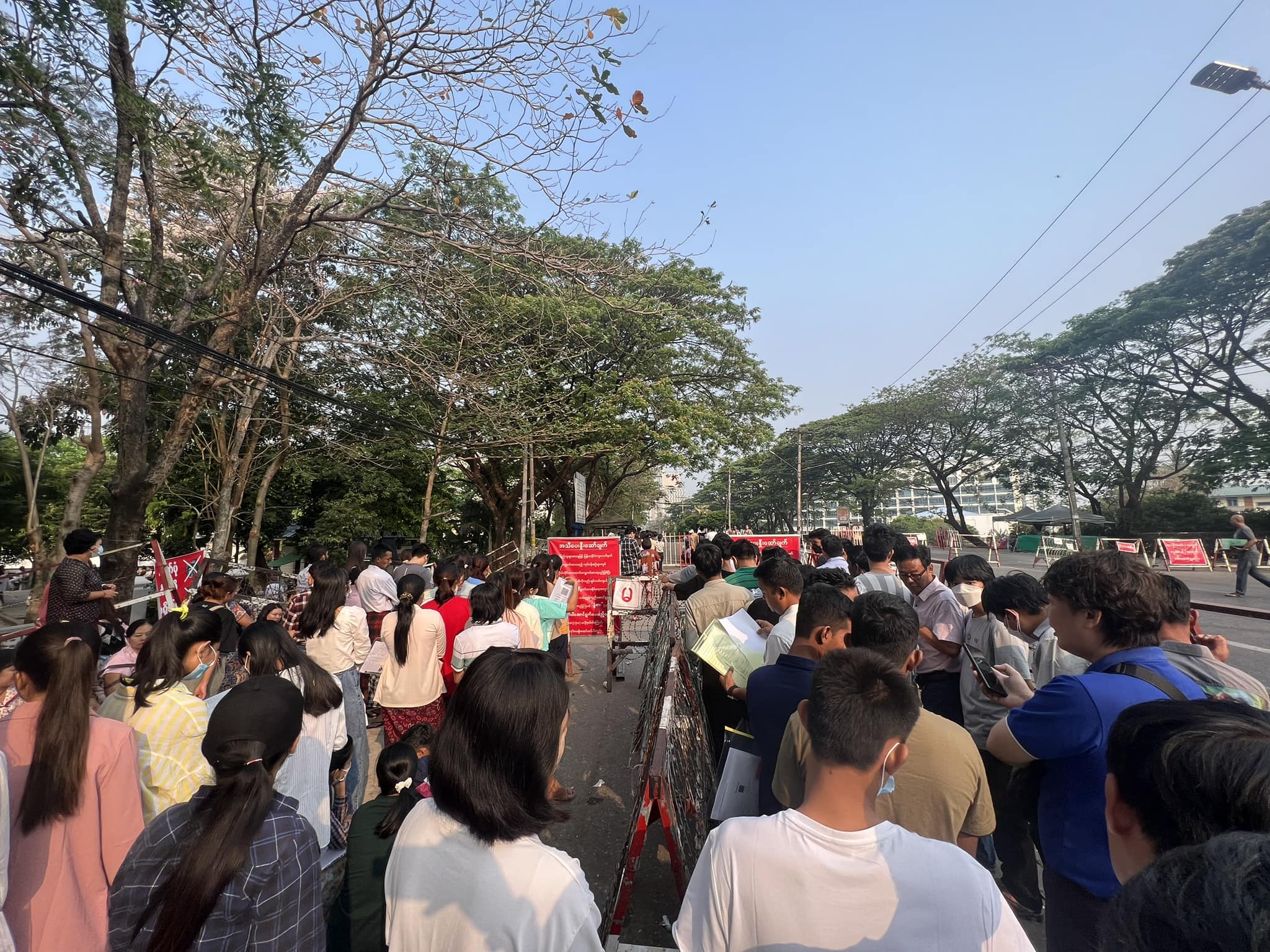
While seeing those who are waiting to apply for passports
It is impractical to tax someone who has not yet been paid and only if passports of seamen were valid, their application form would be accepted by their employers and the Seafarer Recruitment and Placement Service (SRPS), so salary rate could not be estimated in advance, Myanmar Seafarers Federation has stated.
Because countries are different in types of paying salaries, it should be taken into account, the people helping migrant workers pointed out. When taking certificates of having paid tax, the roles of brokers would be important. Ko Naing Naing Aung, director of the Thai-based Arakan Workers Organization, told CNI News.
" We are worried that a lot of brokers will arise. When someone, for example, wants to go to Korea or Japan or Thailand, he wants to get a new passport. But the government will renew his passport only if he has necessary information and documents. But are the documents real? By reason of that, agencies could ask more money. OK, if you don't have the documents, no problem. Give me how much money. I'll apply for you. In this way, brokers will arise. In fact, it encourages brokers and agencies to enable them to ask more money." he said.
Because those who want to renew their PJ and PS passports are asked to show certificates of having paid tax and income tax for six months must be paid in advance, the number of people who will go abroad illegally might increase, which some people review.



